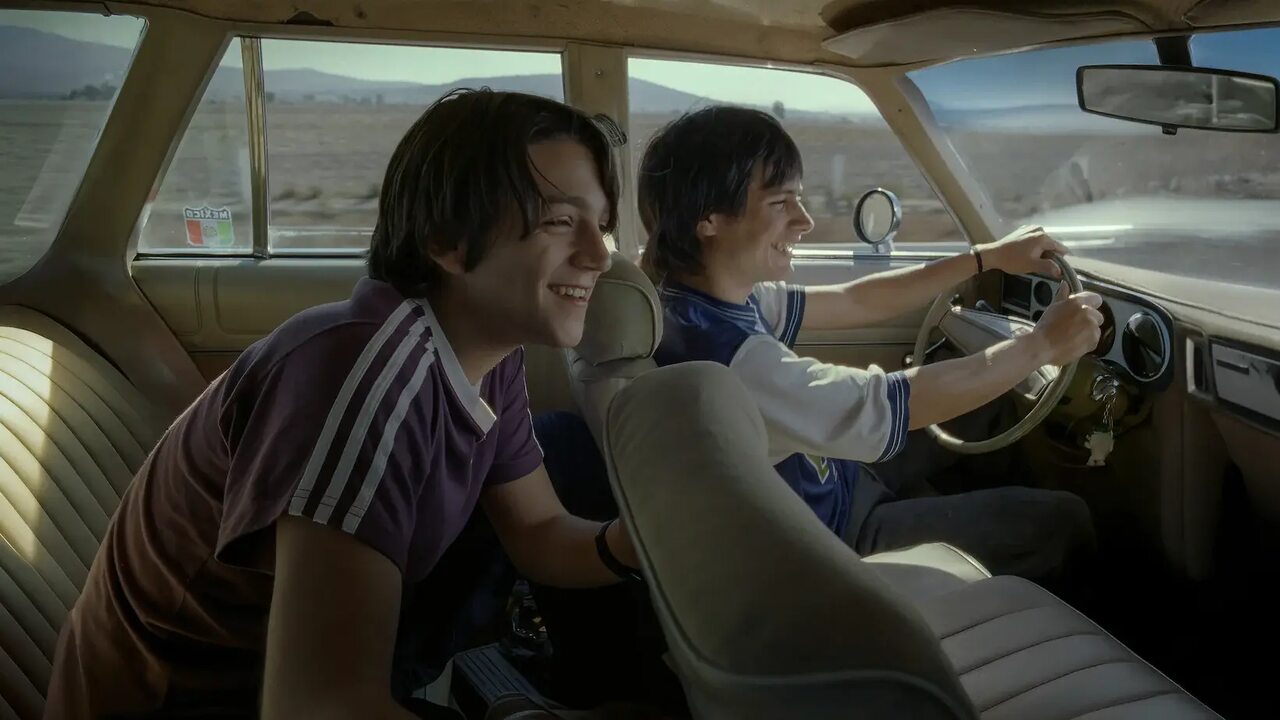
This movie came out 23 years ago and I am amazed by the boldness it has. Besides that, there is supposed to be a plot that is a little hard to understand (or so I felt). Alfonso Cuarón’s Y Tu Mamá También offers a profound, yet unvarnished glimpse into the lives of three individuals navigating the complexities of love, loss, and self-discovery against the vibrant backdrop of Mexico. The film intertwines personal journeys with broader social commentaries, creating a narrative that resonates on multiple levels. However, while the film has received widespread acclaim for its artistry, it also has its share of detractors who critique its approach and execution.
The plot centers on Julio (Gael García Bernal) and Tenoch (Diego Luna), two teenage best friends whose carefree summer takes an unexpected turn when their girlfriends leave for a trip to Italy. Left to their own devices, the boys meet Luisa (Maribel Verdú), a charismatic and enigmatic woman married to Tenoch’s cousin Jano. On a whim, they fabricate a tale about a mythical beach called Heaven’s Mouth and propose a road trip. Initially hesitant, Luisa joins them after learning of her husband’s infidelity, seeking solace and escape from her unraveling personal life.
As they traverse Mexico’s breathtaking landscapes, the trio’s interactions oscillate between moments of humor, tension, and intimacy. The film is unapologetic in its exploration of sexuality, presenting it as a medium of connection and revelation. Through candid conversations and raw encounters, Julio, Tenoch, and Luisa confront their desires, vulnerabilities, and the unspoken truths that shape their identities. These revelations are underscored by Luisa’s hidden struggle with terminal cancer, a poignant layer that she keeps concealed, adding a bittersweet undertone to the journey.
Cuarón’s direction masterfully blends the personal with the political. The omniscient narrator interjects with contextual details about the characters’ pasts and the socio-economic disparities of Mexico, grounding their personal odyssey within a larger societal framework. The cinematography by Emmanuel Lubezki captures the raw beauty of the Mexican countryside, juxtaposing the lush visuals with the emotional turbulence of the protagonists.
Despite its strengths, Y Tu Mamá También is not without its critics. The film’s explicit content overshadows its emotional core, reducing its depth to mere shock value. At one point it feels like the film is filled with intimate scenes and nothing else. The portrayal of female characters, particularly Luisa, feels like she has been put in the film to perpetuate clichés of the “tragic muse,” existing primarily to catalyze the boys’ growth. Her character’s lack of depth and the narrative’s failure to fully delve into her internal world leave her arc feeling incomplete to some. Additionally, the boys’ immature antics, though integral to their coming-of-age, can alienate viewers who find their behavior grating or juvenile.
While the plot no doubt has depth, however, while watching the movie, it is hard to figure out the story. For example, Lusisa’s diagnosis is revealed in the end. When we see her going to a doctor, it is very difficult to understand why she was there. And there are many other scenes of the same nature where the reference is a little hard to figure out.
Final Score- [5/10]
Reviewed by - Neerja Choudhuri
Follow @NeerjaCH on Twitter
Publisher at Midgard Times
Hi Everyone, after a due consideration, we have decided that we will be open for donations to help us in managing our website. We will be greatful for any kind of amount we receive. Thanks!
— Midgard Times 🎬 (@Moviesr_net) January 4, 2026
PayPal- [email protected] pic.twitter.com/DlNNz5Npm5
Get all latest content delivered to your email a few times a month.
Bringing Pop Culture News from Every Realm, Get All the Latest Movie, TV News, Reviews & Trailers
Got Any questions? Drop an email to [email protected]